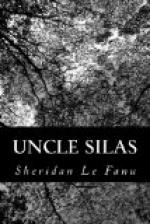And, with an angry chuckle, he turned on his heel, and left the room.
I think I was perfectly right to resist, with all the vehemence of which I was capable, this attempt to assume an intimacy which, notwithstanding my uncle’s opinion to the contrary, seemed to me like an outrage.
Milly found me alone—not frightened, but very angry. I had quite made up my mind to complain to my uncle, but the Curate was still with him; and, by the time he had gone, I was cooler. My awe of my uncle had returned. I fancied that he would treat the whole affair as a mere playful piece of gallantry. So, with the comfortable conviction that he had had a lesson, and would think twice before repeating his impertinence, I resolved, with Milly’s approbation, to leave matters as they were.
Dudley, greatly to my comfort, was huffed with me, and hardly appeared, and was sulky and silent when he did. I lived then in the pleasant anticipation of his departure, which, Milly thought, would be very soon.
My uncle had his Bible and his consolations; but it cannot have been pleasant to this old roue, converted though he was—this refined man of fashion—to see his son grow up an outcast, and a Tony Lumpkin; for whatever he may have thought of his natural gifts, he must have known how mere a boor he was.
I try to recall my then impressions of my uncle’s character. Grizzly and chaotic the image rises—silver head, feet of clay. I as yet knew little of him.
I began to perceive that he was what Mary Quince used to call ’dreadful particular’—I suppose a little selfish and impatient. He used to get cases of turtle from Liverpool. He drank claret and hock for his health, and ate woodcock and other light and salutary dainties for the same reason; and was petulant and vicious about the cooking of these, and the flavour and clearness of his coffee.
His conversation was easy, polished, and, with a sentimental glazing, cold; but across this artificial talk, with its French rhymes, racy phrases, and fluent eloquence, like a streak of angry light, would, at intervals, suddenly gleam some dismal thought of religion. I never could quite satisfy myself whether they were affectations or genuine, like intermittent thrills of pain.
The light of his large eyes was very peculiar. I can liken it to nothing but the sheen of intense moonlight on burnished metal. But that cannot express it. It glared white and suddenly—almost fatuous. I thought of Moore’s lines whenever I looked on it:—
Oh, ye dead! oh, ye dead! whom we know
by the light you give
From your cold gleaming eyes, though you
move like men who live.
I never saw in any other eye the least glimmer of the same baleful effulgence. His fits, too—his hoverings between life and death—between intellect and insanity—a dubious, marsh-fire existence, horrible to look on!
I was puzzled even to comprehend his feelings toward his children. Sometimes it seemed to me that he was ready to lay down his soul for them; at others, he looked and spoke almost as if he hated them. He talked as if the image of death was always before him, yet he took a terrible interest in life, while seemingly dozing away the dregs of his days in sight of his coffin.




